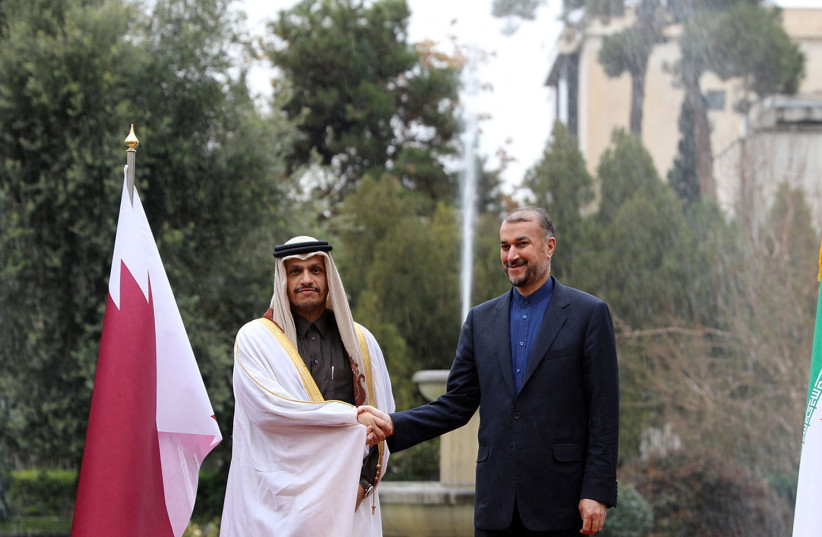Ahead of US president Joe Biden's meeting on Monday with Qatar's Emir Sheikh Tamim bin Hamad Al Thani, the notoriously anti- Baha’i Iranian regime and Qatar’s monarchy are accused of promoting the religious cleansing of the persecuted Baha’i community in the tiny oil-rich Gulf country of Qatar.
Bani Dugal, Baha’i International Community (BIC) representative to the United Nations, said “This pattern of deportation is tantamount to religious cleansing—if it continues, an entire religious community could be erased in a few years.”
Ghanem Nuseibeh, a leading expert on Qatar’s regime and the founder of the London-based Cornerstone Global Associates, told The Jerusalem Post last week that “It is very troubling but not a surprise to hear that Iran is pressuring their allies to persecute the Baha’i community. It has long been a policy of the Iranian regime to persecute the Baha’i community in Iran, but more recently we have seen them being persecuted outside Iran by the regime’s proxy - the Houthis in Yemen and more recently and more troubling, in Qatar. The Qatari regime is clearly acting at the behest of the Tehran regime and collaboration between both states has been going on for several years. “
Nuseibeh, who noted that Qatar’s regime seeks to strip the Baha’is of their residency rights in Qatar, said Qatar “is making a dangerous gamble because in the year that it hopes to host the FIFA World Cup, is carrying out such persecution against a religious minority. Claims that Qatar is open to people of all faiths and backgrounds is clearly undermined by the Baha’i persecution and therefore Qatar’s suitability to host the World Cup should - once again, be questioned.”
The alarm bells that Nuseibeh is now ringing comes after the Baha’i International Community (BIC) issued an alarming report last year that “it is extremely concerned by systematic attempts over many years by Qatari authorities to blacklist and deport Baha’is from Qatar.”

Haifa is considered a holy city for the Baha'i faith, where the famous Baha'i Gardens are situated, as well as the governing body of the Baháʼí faith.
BIC wrote that “A prominent Baha’i, Omid Seioshansian, who was born in Qatar, is the latest to be blacklisted in Qatar. Certain authorities in the country have suggested that unspecified criminal and national security charges have prompted these expulsions. The baseless charges, which have been leveled without evidence, could carry severe penalties in Qatar’s judicial system.”
The Baha’i organization added that “Once blacklisted, Baha’is are expelled from the country and are permanently refused reentry—even to visit. In one instance, the spouse of a Qatari Baha’i was denied residency, and consequently the couple’s entire family was forced to leave the country. Residency permits of non-Qatari Baha’is have also been denied, or not renewed, despite their employers or sponsors supporting them to remain in the country.”
According to BIC the repression of the Baha’i in Qatar “ bears a striking resemblance to types of persecution Baha’is have faced in Iran and Yemen. Most of those facing blacklisting and deportation were born and raised in Qatar and have known no other home, some coming from families whose presence in that land stretches back multiple generations, predating the independence of the state of Qatar itself.”
Nuseibeh said the “Persecution of the Baha’i minority is also something that Muslim Brotherhood [MB] would call for and given the strong alliance between Qatar and MB whose leadership is based in Qatar, persecuting the Baha’i is also in line with the general overall Islamist objectives of the Doha regime.”
The alleged intensified persecution of the Baha’i in Qatar coincides with a new wave of repression targeting the peaceful religious group.
Writing on the website of the US think tank The Washington Institute for Near East Policy, the Iranian scholar Mehdi Khalaji, a Qum-trained Shiite theologian, noted that “Targeting the faith’s followers is a longstanding feature of the Islamic Republic but has been escalating of late.”
Khalaji wrote on January 18, "a court in Iran’s Mazandaran province ordered that property belonging to Bahai citizen Sheida Taeed be confiscated and transferred to the 'Execution of Imam Khomeini’s Order,' a committee controlled by Supreme Leader Ali Khamenei." He added that "two courts declared last year that the land ownership claims of twenty-seven Bahai in the village of Ivel were illegal. The village is located in Mazandaran, the province that gave birth to the faith’s founders and is now home to one of the largest Bahai communities in the country."
The US Oberlin College professor Mohammad Jafar Mahallati, who was accused by the Oberlin Review student paper in November of setting a precedent to wipe out the Baha’i community in Iran, is facing calls for his termination from the liberal arts college in Ohio. The Oberlin Review wrote that” Iran has so successfully obfuscated its crimes against humanity — through mouthpieces like Mahallati and many others — that it has been able to continue perpetrating such crimes to the present day. Most egregiously, Mahallati’s rhetoric about the Baha’is laid the groundwork for Iran to commit genocide against the Baha’i community. To this day, Baha’is are systematically persecuted, tortured, and killed in Iran.”
Amnesty International alleged Mahallati was complicit in crimes against humanity by covering up the mass murder of at least 5,000 innocent Iranian prisoners in 1988. Mahallti denied the allegation in a statement to the Post.
The Post reported last year that the Israeli government accused of Qatar’s regime of financing the Iran’s Islamic Revolutionary Guard Corps, a US-designated terrorist organization. In 2020, the Post reported that a private security contractor who penetrated Qatar’s military and intelligence apparatus said Doha funds the terrorist movement Hezbollah. Qatar faced allegations from a German minister in former Chancellor Angela Merkel’s cabinet that the monarchy financed the Islamic State.
The Post sent press queries to Qatar's government.
